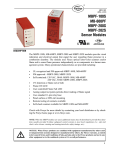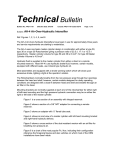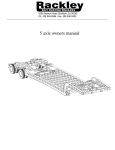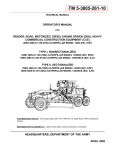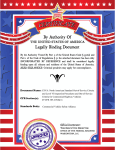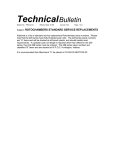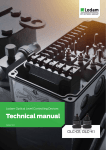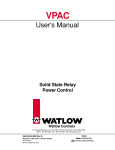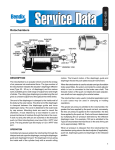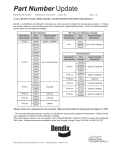Download model h & hx butt welders
Transcript
MICRO WELD MODEL H & HX BUTT WELDERS MICRO PRODUCTS COMPANY SERVICE MANUAL 1 TABLE OF CONTENTS 1.0 2.0 3.0 4.0 5.0 6.0 7.0 8.0 9.0 10.0 11.0 12.0 13.0 1.0 SPECIFICATIONS GENERAL OPERATING INSTRUCTIONS BASIC OPERATING PARTS BASIC OPERATING PARTS LOCATION TYPICAL OPERATING SEQUENCE SPECIAL ADJUSTMENTS PREVENTIVE MAINTENACE SUGGESTED SETTINGS DIAGNOISTIC CHART FOR TROULBE-SHOOTING ELECTRICAL SCHEMATIC SAFETY REMINDERS BUYERS GUIDE PARTS LIST SPECIFICATIONS Type of Welding Process Welding Range Material Suitability Standard Operating Voltages Maximum Line Demand 460 Volt Maximum Line Demand 230 Volt Single Phase AC Transformer Clamp Method Upset Method Mounting MODEL H Butt Weld .125 to .625 Steel Rod 460/230 Volts 25amps@100% duty cycle 79amps@10% duty cycle 50amps@100% duty cycle 158amps@10% duty cycle 16 KVA @ 50% duty cycle Pneumatic, Foot Controlled Pneumatic, Adjustable 4-Caster Wheels MODEL HX Butt Weld .125 to .750 Steel Rod 460/230 Volts 42 amps@100% duty cycle 133 amps@10% duty cycle 84 amps@100% duty cycle 266 amps@10% duty cycle 27 KVA @ 50% duty cycle Pneumatic, Foot Controlled Pneumatic, Adjustable 4-Caster Wheels Dimensions and Weights Height Overall Floor or Bench space Welding Die Height Weight 46”-Truck 39” x 29” Truck Type 41” – Truck Type 560 LBS – Truck Type FEATURES • • • • • • • • Micro Weld quality and workmanship Heavy-duty construction & components East to operate controls Low maintenance costs Easy to set welding parameters Safety electrical switch circuits Heavy-duty weld heat selection switch Sensitive straight slide movable headpiece assembly 2 2.0 GENERAL OPERATING INSTRUCIONS 2.1 ELECTRICAL HOOK-UP INSTRUCTIONS First determine that available electrical service in your plant corresponds to the nameplate rating located on welder housing. Electrical wiring to welder must be of sufficient size to deliver full ampere load with no appreciable loss during weld cycle. The welder will not operate properly if there is more than a 10% variation in the line voltage. In general, the welder should be fused with a slow blow fuse of the 100% duty cycle rating. The minimum power cable size to the welder can be obtained by using this same current rating. Refer to National Electrical Code and local electrical regulations for adequate power sizes; disconnect methods and fusing guidelines. Remember line voltages to the welding machine are potentially dangerous should the power cords be damaged or severed. The welding voltages at the welding dies will not harm an operator since they do not exceed 10 volts. 2.2 SAFETY PRECAUTIONS (See section 11.0) 2.2.1 ELECTRICAL Maintain electrical cable to welder in good repair. Welder must be grounded and connections securely tightened. Heat Switch must not be changed to new position while a weld cycle is in process. Disconnect electrical service before serving welder – high voltages are located within the base of the welder. 2.2.2 MECHANICAL Operator while using welder must wear safety glasses. Keep all safety guards on welders and use properly. Operators must be instructed on basic operation of unit to prevent injury. Check nameplate rating and keep within material size range for each welder. 3 2.3 WATER HOOK-UP (If so equipped) It is important that if a welder is to be operated for an extended period of time and heads heat up, water lines must be connected to the welder. Connect hoses to inlet and outlet provided at the back of the welder. Shut-off valve should be installed in the inlet line and the hose from the outlet should run to an open sight drain. Water should be turned off when the welder is not in use. 2.4 AIR HOOK-UP Set air regulators for form 20 to 80 lbs. A safety pop-off valve will be activated when air gauge is set for over 100 lbs. 2.5 WELDING DIES The dies and shoes supplied with the welder will handle most size and material types within the range of the welder. For new weld applications consult the factory for special die and shoe sets. 3.0 BASIC OPERATING PARTS 3.1 WELD HEAT SELECTION SWITCH Welding heat is selected by means of a heavy-duty tap switch, either six (6) or twelve (12) steps of voltage. The switch is located conveniently on the lower front of the welder. Number one (1) indicates high heat; number six (6) or twelve (12) indicates low welding heat. Other numbers are equally graduated from high to low to allow just the right amount of voltage for the weld operation. The model H has a six (6) point heat switch and the Model HX has a twelve (12) point heat switch, 4 3.2 HEAD SPACING MECHANISM 3.2.1 The open head space adjustment bolt and locking jam nut are located on the upset cylinder mounting plate to the immediate left front of the upset cylinder. The open space scale also located on the front of the upset cylinder mounting is a quick reference guide for determining the amount of open space by lining up the pointer on the movable head endplate with the graduations on the scale. When the pointer is in line with no. O on the scale. There is a .020” space between the inside of the welding dies. There is an increase of 1/4” spacing between the dies for each graduation on the scale. 3.2.2 The closed head stop bolt and locking jam nut are located in the movable head endplate in line with the open spaceadjusting bolt. The closed space stop should be adjusted so that there is never less than .020” spacing between the dies. The minimum .020” spacing must be maintained as an electrical safety feature otherwise damage will occur to the machine. 3.3 LIMIT SWITCH The weld limit switch controls the cut-off point of current flow to the welding dies. Limit switch adjustment is made by moving the switch-initiating barrel, along the threaded stud mounted in the movable headpiece. (See section 8 for suggested settings). 3.4 WELDING DIES The welding dies (lower and upper die shoes), serve three purposes: (1) to carry current for welding, (2) to align two ends of stock, and (3) to prevent material slippage during a weld cycle. Small rod is placed in the smaller grooves and the larger rod is placed in the bigger grooves. 3.5 THE OPERATING LEVER The welder-operating lever is located at the top of the regulator housing, located on the right end of the welder truck. Keep hands away from clamp arms and headpiece when operating the lever. The lever must be depressed the entire ay when welding. The first part of the lever movement allows the air from the top regulator to pass to the air-upset cylinder. This makes firm contact between the ends of the stock to be welded. At the bottom of the operating lever movement, the lever initiates the weld switch, which starts the weld. 5 3.6 CLAMP ARMS The clamp arms are air operated. The foot controlled air valves are used to initiate the air clamp cylinders. The foot valves are located at the bottom of the welder housing. The right foot pedal operates the right clamp arm, and the left pedal operates the left clamp arm. To clamp stock, place it in the proper welding die groove and press the top edges of the tilt pedal on foot valve. To release stock, press on bottom edge of foot valve tilt pedal. Caution: care must be used when clamping stock, be sure hands are clear of clamp arms. 3.7 ANNEAL SWITCH The anneal switch is located directly above operating lever, it is also known as the weld switch. When annealing make sure to depress the anneal switch only. (See typical anneal sequence) 6 4.0 BASIC OPERATING PARTS LOCATION 7 5.0 TYPICAL OPERATING SEQUENCE All insulating materials must be removed from conductors where they contact lower welding dies. 5.1 Set weld heat selection switch to recommended chart setting. 5.2 Set upset pressure to recommended chart setting (PSI). 5.3 Adjust the head open space to proper chart setting. 5.4 Place the stock into welding dies so wire ends meet midway between each die. Clamp into position with foot valve pedals. 5.5 Lower the flash guard and raise up on the operating lever until it initiates the operation switch, hold for 1 to 3 seconds to assure a complete weld cycle. 5.6 Unclamp welded conductors. 5.7 Trim off weld burr so welded area is equal to parent material diameter. Incomplete burr removal or undercutting of the weld area will result in subsequent weld breaks. 5.8 Typical anneal operating. The stock should be clamped in the anneal clamps with the weld midway between the clamps. Reach above the operating lever and press the weld/anneal switch only. The switch should be jogged on and off to allow the heat to spread out in the stock. Heat the stock to the proper anneal temperature and allow to cool to where there is no color before removing the weld burr. The temperature required for annealing should be slightly above the critical point which varies for different steels. Low carbon steel (1008-1018) should be annealed at about 1650 degrees F., and mild to high carbon steel (1018-1090) at about 1400 degrees to 1500 degrees F. This temperature should be maintained just long enough to heat the weld zone evenly. DEGREES FARENGIHT 750 degrees 975 degrees 1290 degrees 1470 degrees 1650 degrees 1830 degrees TEMPERATURE BY COLOR Red heat, visible in the darkness Red heat, visible in the daylight Dark red Dull cherry red Cherry red Bright cherry red (too hot) Note: The critical temperature is quickly identified by the loss of the steel’s magnetic properties. 8 6.0 SPECIAL ADJUSTMENTS Model H, HX Refer to section 8.0 for approximate settings. 6.1 WELD HEAT SELECTION The weld heat selection switch is set simply by rotating the handle with pointer to the number of heat required to make a good weld. 6.2 HEAD SPACING The closed head stop once set should never need changing. This set to keep the weld dies from hitting each other when upset is activated without stock being clamped in the dies. To make this adjustment turn the air upset regulator to 10 PSI, with the flash guard in the up position lift up on the upset lever to move movable headpiece, now check space between dies, the space should be .020” then loosen the locknut on the closed stop bolt and adjust until the space is correct. Now retighten the locknut. After adjusting the closed space, the open space can be adjusted to the proper setting for the stock to be welded. Use the open space scale when referring to actual setting. 6.3 LIMIT SWITCH Loosening the lock nut then turning the tapered adjusting nut to the correct setting makes the limit switch adjustment. Clockwise will turn current off earlier, counterclockwise will turn the current off later. This setting can be used to lessen the amount of weld burr. By adjusting the limit switch to lessen the weld burr, decreased weld quality could result. 6.4 MODEL HX BURN-OFF INSTRUCTIONS If unit is water-cooled and rate of burn off is high, unit will require the water-cooling to prevent overheating of the dies and headpiece. Connect the input line to one end of water cool circuit. This input line should have a shutoff valve so that water supply can be cut off when not in operation. This will present condensation on headpiece, which could cause transformer burn out. Water output hose should be open – this will allow testing of water temperature. During operation, flow should be adjusted so that output feels warm to hand. This will minimize condensation. 9 The hand knob at right hand end of truck adjusts the space between the clamping jaws of dies. See setting chart at end of instructions for approximate burn-off settings. Operating switch is located in aluminum housing at the end of the welder truck. Switch is located at top with switch plunger extending down. Clamp arms are air operated. The foot-operated valves are located at the bottom of welder housing. Caution: Care must be used when clamping stock, be sure hands are clear of clamping dies before operating foot valves. Sequence of operation: 1. Set weld heat and die spacing per chart 2. Clamp stock in jaws 3. Press and hold operating switch till stock between jaws melts and is blown away. Note: Some cables have filler cord with an asphalt impregnation. The asphalt will melt and run into the jaw grooves. Jaw grooves must be kept clean, also the connection between the jaw and jaw seat so that good electrical connection is maintained. Stranded Material Size 5/8” diameter 3/8” diameter 5/16” diameter 1/4” diameter Heat 6 or 7 9 9 9 Space 1/8” to 1/4” 1/8” 1/8” 1/8” Clamp Pressure 80 PSI 80 PSI 80 PSI 80 PSI Note: Use wire brush to remove zinc oxides and beads from die and shoe grooves. Because of thick zinc coating this cleaning of grooves should be done often to allow good electrical contact between dies and stock. 10 7.0 PREVENTIVE MAINTENANCE TECHNIQUE Keep in Mind that these welders are precision built to last many years, but will require good maintenance procedures. They are designed to be as automatic as possible with a minimum dependence on the ability of the operator. Adjustments must be made by those thoroughly familiar with the operating principles of the welders. 7.1 WELDING DIE NOTES 7.1.1 Welding dies and die shoes in poor condition are the primary caused of bad welds. 7.1.2 Check die sets for excessive wear and replace if necessary. 7.1.3 Clean weld die bottoms to remove oxides with emery cloth placed on a flat surface. 7.1.4 Clean die seats with emery cloth to brighten contact areas. 7.1.5 After cleaning of dies be sure to wipe off with soft clean cloth. 7.1.6 Completely tighten dies into seats to assure a good contact. 7.1.7 Worn die shoes will not hold stock during a weld cycle, change steel faces or replace complete shoes. 7.2 WEEKLY 7.2.1 Tighten all loose parts. 7.2.2 Check for water leaks (if applicable). 7.2.3 Check for air leaks. 7.2.4 Drain airline filter bowls. 7.2.5 Tighten all loose parts. 7.3 QUARTERLY 7.3.1 Repeat above service items. 7.3.2 Check grease requirements on clamp arms pivot shafts and lubrication points. 7.3.3 Check anneal parts and replace all worn or broken assemblies 7.3.4 Check contacts on magnetic contactor for worn contacts. 7.3.5 Clean heat switch contacts with low residue cleaner and recoat with petroleum jelly. 7.4 ANNUALLY 7.4.1 Repeat previously noted items. 7.4.2 Check for wear in clap arm pivots. 7.4.3 Clean inside and outside of welder. 7.4.4 Check grease requirements on headpiece slide shafts, grease lightly. 7.4.5 Caution: make sure that power supply is disconnected before servicing welder in anyway! 11 7.5 WELDING DIES AND DIE SHOES INFORMATION Description: Welding dies – Lower conducting electrode and clamp jaw. Welding die shoes – Upper clamping member. Welding dies and die shoes in poor condition are the main causes of bad welds. Care of die sets: 7.5.1 Use a brass or fiber blade to remove particles of flashings that build-up on die sets. Excessive flash build-up causes die burns on material and shorting of die sets. 7.5.2 Do not attempt to clamp material that is not suited for welder into die sets. Undersize materials will slip and burn die grooves, oversize materials will overstress clamping parts. 7.5.3 Do not use welding die sets for a vise. not withstand the mechanical abuse. These parts will 7.5.4 Whenever welding dies are replaced, clean bottoms of dies and corresponding die seats to a bright and clean condition before bolting them tightly into place. An oxidized surface will insulate the welding dies and reduce effective welding voltage. 7.5.5 Welding die set will wear with use and must be changed occasionally for good welding results. Keep and adequate supply of replacement parts available. Wire and rod slippage is a problem caused by poor die sets and a major cause of wire breaks. 12 13 9.0 DIAGNOSTIC CHART FOR TROUBLE-SHOOTING WELDING ACTION Weld action normal but weld burr doesn’t extend beyond wire Molten metal is blown out and ends not joined Weld has complete burr but is dry and breaks off below surface of wire Welds good but poorly aligned Ends of wire buckle and may not weld Varying weld results CAUSE Lack of spacing Weld heat too high Stock is too small Low upset pressure Upset pressure too great High carbon steel wire Welding dies & die shoes Starting space Loose head shafts Upset pressure too great Low weld heat Stock slipping Varying weld voltages Rod condition variations Dies and die shoes Flashings 9.1 REMEDY Increase starting space until desired burr is obtained Lower heat settings Check size rating of welder Adjust upset air regulator Lower upset pressure Carbon-steel wire often appears like this, process wire by annealing weld before removing burr Replace worn dies and shoes Decrease starting space Return heads to factory Decrease upset pressure Increase weld heat Increase clamp air pressure Check electric lines Clean and tighten transformer connections to heads Clean rod where clamped in dies Replace die shoes Clean build-up of flash materials ELECTRICAL TROUBLE-SHOOTING OF WELDER (Caution!! Extreme care should be exercised when making these tests. Dangerous voltages are present in the welder. Only persons familiar with electrical safety precautions should perform these tests.) 9.1.1 TROUBLE-SHOOTING TABLE (See section 9.1.3) This electrical trouble-shooting table is furnished as a suggested method of trouble-shooting the welder. The individual steps of the table should be performed in the order given, to make the tests valid. The electrical schematic (section 10) furnished for these tests show the table test points. The table may be used for welders with a different but closely related wiring by using corresponding test points. During all tests, line voltage should be connected to L1 & L2 of the welder. The heat switch should be set to the #1 position. 14 9.1.2 FINAL ELECTRICAL CHECKS Set the heat switch to the number 1 position, connect the voltmeter across the welding dies. Press the operating switch. The meter reading will typically be less than 10 VAC. Consult the weld specification sheet for this value. Rotate the heat switch through all settings. If the voltage is not read at any setting, the heat switch may be defective. Actuate the weld limit switch; observe the reading goes to zero. Release the weld limit and operating switches, the reading should remain at zero. 9.1.3 TEST LEAD CONNECTION X1 X2 X2 FU1-1 X2 FU1-2 METER READING 115 VAC 115 VAC 115 VAC X2 LS1-1 X2 LS1-2 115 VAC 115 VAC X2 LS2-1 X2 LS2-2 115 VAC 115 VAC X2 X2 L2 L2 L1 LS3-1 LS3-2 CR1-1 CR1-2 S1-1 115 VAC 115 VAC Line voltage Line voltage Line voltage PROBLEM IF NO READING Bad control transformer(T1) Bad fuse connection Open fuse Open wire to operating switch Bad operating switch Open wire to flash guard switch Open flash guard switch Open wire to weld limit switch Bad weld limit switch Open wiring to contactor Bad contactor Open wire to head switch PRESS OPERATING SWITCH WELD LIMIT SWITCH ACCTUATED PRESS ANNEAL SWITCH X X X X X X X NOTE: To perform repair consult section 13 for parts identification. 15 16 11.0 SAFETY REMINDERS The following accident prevention information is presented to eliminate potential hazards while operating, inspecting or repairing Micro-Weld electric resistance welding equipment. Important safety compliance information for Micro-Weld Welders. GENERAL 1. Qualified personnel, prior to using equipment, must instruct an operator on basic operation and malfunction methods. 2. Safety eyeglasses must be worn by all personnel operating or servicing welders. 3. Use safety equipment properly and keep safety equipment on welders. 4. Determine that both operating voltages and hertz (cycles) of power supply correspond to ratings listed on welder nameplate located on welder housing. 5. Check nameplate ratings and keep within capacities and material categories stated therein. 6. Adjustments or repairs must be made by persons thoroughly familiar with operating principles of welder. 7. Welder must be disconnected from power supply prior to maintenance or repair procedures. ELECTRICAL 1. Refer to National Electrical Code and local regulations for adequate electrical wiring to power welder. Do not operate welder with inadequate electrical power supply cords or cable. 2. All welders must be grounded through power supply and welder ground connection terminal securely tightened. 3. All welders must be able to be disconnected from power source either by a double breaking disconnect switch or unplugged by standard rated plugs. 4. All welders must be fused to prevent injury should an electrical malfunction occur. Welders must never be fused for an ampere load that exceeds the ratings stated on welder nameplate. Normally welders are fused using the nameplate rated load; time lag parameters functional to standard fuses allow this specification. 5. Electric power cords to welder must be kept in good condition. Report any damage or potential hazards to maintenance personnel. 6. The weld heat selection switch, potentiometer or range selection devices must not be changed to a new position while a weld operation is in process. 17 12.0 BUYERS GUIDE HOW TO ORDER PARTS: You must provide 1. Machine Model 2. Machine Serial Number 3. Voltage Then identify part(s) on part list (last page in book) and provide MICRO with the circled number. CALL MICRO at 800-872-1068 OR FAX MICRO at 630-787-9360 Provide MICRO with your company name and purchase order number. 18 13.0 PARTS LIST 19 20 21 22 PARTS LIST H, HX SERIES BUTT WELDERS MODEL/ PART NO. DESCRIPTION ITEM # H-01A H-01B H-03 H-03A H-03B H-04 H-05 H-06 H-07 H-08L H-08R H-09 H-10 H-11 H-12 H-13 H-14 H-15 H-16 H-17 H-18 H-19 H-19A H-20 H-21 H-22 H-23 H-23A H-24 H-25 H-26 H-27 H-30 H-31 H-32 H-33 H-34 H-35 H-36 H-37 H-37C H-39 H-41 H-41A Basic head match machined Complete head assembly Flash guard assembly Flash guard mount screw Flash guard switch Shaft shield Shaft shield mount screw Outer clamp arm pin washer Inner clamp arm pin washer Clamp arm, left Clamp arm, right Clamp arm pivot pin Outer arm pin bolt Inner arm pin screw Stat. Head mount bolt, rear Stat. Head mount bolt front, left Stat. Head mount bolt front, right Secondary mount bolts, movable Secondary mount bolts, stationary Secondary clamp plate, stat. Head Head return spring, mov. head End plate, movable head Limit switch scale screw End plate mount bolt Grease fitting 90 degrees Grease fitting, straight Closed head stop bolt Closed head stop nut Clamp cylinder #20 Cylinder shaft protecting boot Cylinder diaphragm #20 Hose fitting, brass Insulating plate, upset frame Insulating washers & tubes Steel washers, upset frame Upset frame mount screws Open head stop bolt & nut Open space scale Scale mount screws Limit switch, roller type Limit switch cover Limit switch mount screws Limit switch actuator nut Actuator nut locknut 31054 31055 31056 90258 57813 31014 90821 31546 31006 31017 31030 31000 90258 90811 90657 90663 90664 90509 90659 51000 80056 41076 31009 90260 48422 48423 90327 92106 77703 77715 77710 94302 41002 31061 92751 90260 90329 41005 91048 57811 51001 91048 31008 31007 23 PARTS LIST H, HX SERIES BUTT WELDERS MODEL/ PART NO. H-42 H-43 H-44 H-46 H-47 H-48 H-49 H-50 H-51 H-52 H-55 H-57 H-58 H-58R H-59 H-60 H-60L H-60R H-61 H-61L H-61R H-61S H-62 HX-68 HX-68A H-70 H-71 H-72 H&HX-72 HX-72 H-72A H-74 H-75 HX-76 HX-77 HX-78 HX-79 H-80 H-81 H-82W H-85 HX-97 H-98 H-104 H-109 DESCRIPTION ITEM # Cylinder shaft boot #12 Rotochamber #12, upset Cylinder diaphragm #12 Weld transformer, state voltage & S/N Transformer primary coil, state voltage & S/N Transformer secondary, state voltage & S/N Transformer support strap Transformer ring ¾” transformer stud ½” transformer stud Upset cylinder mount plate Die mount bolt V-groove dies, copper Radius groove die set Shoe mount washers Shoe set w/inserts Steel shoe, left Steel shoe, right Set of inserts, 4 pcs. Steel insert, for left shoe Steel insert, for right shoe Steel insert, straight Insert mount screw Auto transformer Primary coil, auto transformer 6 pt. Heat switch Heat switch mount bolts Weld contactor 440V Weld contactor 240V Weld contactor 240V Contactor repair kit Terminal block Terminal block mount screws 12 point heat switch Weld transformer, 2 tap 2 tap primary Secondary Complete truck Swivel caster Wheel only Truck door Foot pedal muffler Foot pedal #4 shear Vise, standard 77715 77700 77708 51008 53037 51011 33291 51002 51005 90301 41003 90660 31020 31042 92753 31053 31001 31002 31052 31004 31005 31003 90704 51019 51018 56549 90294 57609 57610 57611 57625 53000 90204 56547 53047 51027 51026 41096 48108 spcl. 41014 77892 77859 64009 78112 24 PARTS LIST H, HX SERIES BUTT WELDERS MODEL/ PART NO. DESCRIPTION ITEM # HX-109A H-110 HX-110 HX-110A H-111 H-114 H-115 H-116 H-117 H-118 H-119 H-120 H-122 H-123 H-125 H-125A H-126 Heavy duty vise Vise bracket Vise bracket Heavy duty vise bracket Vise mount bolt #4 shear blades Anneal bracket, CA Anneal bracket mount screw CA anneal clamps, pair Anneal mount bolts, CA Anneal bracket, CAL CAL anneal clamps, pair Anneal mount bolts, CAL Clamp arm flow control valve Control step-down Fuse block Heavy duty step-down 78111 60022 60004 60005 90262 78204 62085 90509 62096 90258 62085 62020 90258 77862 57601 58119 59523 H-A19 Complete air frame assembly 59511 25































